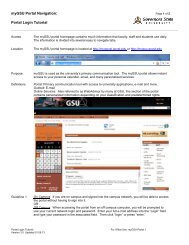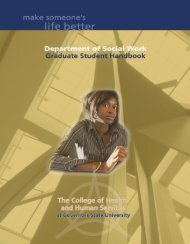Master of Occupational Therapy Program - Governors State University
Master of Occupational Therapy Program - Governors State University
Master of Occupational Therapy Program - Governors State University
You also want an ePaper? Increase the reach of your titles
YUMPU automatically turns print PDFs into web optimized ePapers that Google loves.
Critical Reasoning<br />
Critical reasoning is the process by which experience, theory, information, ethics,<br />
advocacy,<br />
cultural competency, the act <strong>of</strong> thinking critically or reflectively, and situation specific<br />
issues combine to result in best practice. Given the constant interplay <strong>of</strong><br />
person/group/community, performance and context, critical reasoning becomes the<br />
necessary process by which judgments are formed. Through critical reasoning, one<br />
recognizes that any change at one point entails changes elsewhere (Argyris and<br />
Schon, 1974). This process is built in part upon the foundation <strong>of</strong> experiences and<br />
reasoning which occur during clinical experiences and opportunities and requires the<br />
ability to process information, take action, and simultaneously reflect on this action to<br />
learn from it.<br />
As an outcome <strong>of</strong> our program, graduates will use critical reasoning skills to<br />
synthesize information from course content, occupational therapy fieldwork,<br />
personal experiences, contextual factors and research from the field <strong>of</strong><br />
occupational therapy and related fields, to enhance the well-being <strong>of</strong> individuals,<br />
families, and society in a variety <strong>of</strong> systems.<br />
Lifelong Learning<br />
Lifelong learning is the continued self-directed acquisition <strong>of</strong> new knowledge and skills.<br />
This learning can be generalized to other experiences and may be applied directly to<br />
occupational therapy practice. Lifelong learning supports growth as a human being,<br />
enhancing an individual’s therapeutic use <strong>of</strong> self.<br />
Learning occurs through everyday experiences and open communication with those<br />
served, the community, and colleagues. It occurs through written resources such as<br />
texts and journals, attendance at conferences and continued educational experiences,<br />
mentoring, participation in research activities, and active involvement in pr<strong>of</strong>essional<br />
and community organizations.<br />
As an outcome <strong>of</strong> our program, graduates will demonstrate the responsibility <strong>of</strong> a<br />
lifelong commitment to learning, research, and service with health and human service<br />
agencies. Through this commitment to lifelong learning, the graduates will continually<br />
add to their impact on the health and well-being <strong>of</strong> all persons served and society as a<br />
whole.<br />
Curriculum Sequence<br />
The curriculum design provides the basis for program planning, implementation, and<br />
evaluation.<br />
The program is built upon a strong prerequisite academic base <strong>of</strong> liberal arts and<br />
scientific knowledge. During the foundational sequence, the emphasis is placed on<br />
basic and applied human sciences, including anatomy, physiology, movement analysis,<br />
and neuroscience. Focus is placed on the acquisition <strong>of</strong> basic information about health





